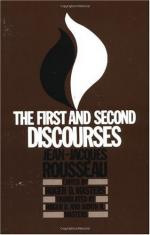
|
| Name: _________________________ | Period: ___________________ |
This test consists of 15 multiple choice questions and 5 short answer questions.
Multiple Choice Questions
1. What does Rousseau say are divided between amour-propre and primitive emotions?
(a) Repressed men.
(b) Children.
(c) Good men.
(d) Women.
2. What does Rousseau argue does not enter into consideration when a nation is formed by men?
(a) Love.
(b) Laws.
(c) Equality.
(d) Fairness.
3. What did the man who invented property rights found according to Rousseau in Chapter 5?
(a) Society.
(b) Law school.
(c) Tribunals.
(d) Banks.
4. What does not preserve liberty according to Rousseau?
(a) The king.
(b) The state.
(c) Alienating one's liberty.
(d) His theory.
5. What does the human owe many of their ideas to according to Rousseau?
(a) Chance.
(b) Speech.
(c) Knowledge.
(d) Art.
6. What does Rousseau say binds the poor and gives the rich new power?
(a) The law.
(b) Tribunals.
(c) Agriculture.
(d) Leaders.
7. What knowledge cannot be imputed when imagining the state of nature according to Rousseau?
(a) War.
(b) Law.
(c) Justice.
(d) Love.
8. What can magistrates easily usurp according to Rousseau?
(a) Money.
(b) Lives.
(c) Properties.
(d) Power.
9. What does Rousseau say would have been prevented if someone called on the lies of the man who invented property rights?
(a) Trials.
(b) Many calamities.
(c) Banks.
(d) Lawyer.
10. How do people see the weak according to Rousseau?
(a) Enslaved.
(b) People try to not to see them.
(c) As ignorant.
(d) In power.
11. What does Rousseau want his rulers to consider?
(a) Rousseau's needs.
(b) France's needs.
(c) Hobbes' ideas.
(d) The people's needs.
12. How does Rousseau want to live his life?
(a) Fast.
(b) Quietly.
(c) Nicely.
(d) In freedom.
13. What does Rousseau say of the needs and goals of the society compared to that of the government?
(a) The needs of the government trump the ones of the people.
(b) The people should require that his needs be taken into account.
(c) They might not be the same.
(d) They are always the same.
14. According to Rousseau, who is forced to follow what men are doing?
(a) Their neighbor.
(b) Other countries.
(c) Their spouses.
(d) Their children.
15. Who is Chapter 3 dedicated to?
(a) Rousseau's ruler.
(b) Rousseau's sister.
(c) Rousseau's brother.
(d) Rousseau's mother.
Short Answer Questions
1. What would make the state decay according to Rousseau?
2. What does Rousseau say of the process that makes men both wicked and sociable?
3. What does Rousseau want his countrymen to submit to?
4. According to Rousseau, what is the first step to uncover the nature of inequality?
5. What does Rousseau conclude social and political inequality is not?
|
This section contains 405 words (approx. 2 pages at 300 words per page) |

|




